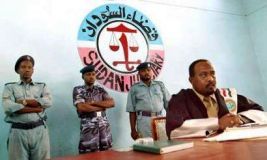US, Europe debate venue for Darfur trials
By Colum Lynch, the Washington Post
UNITED NATIONS, January 21, 2005 — The United States and the European Union are headed for a showdown over which court should try cases arising from mass killings in the Darfur region of Sudan, according to senior U.S. and European officials.

|
|
A special judge, sits in court in Nyala Sept 30, 2004 to try six Sudanese men accused of belonging to the Janjaweed, who killed 24 people in the southern Darfur region in Oct 2003.(Reuters). |
European Union members are preparing to press the U.N. Security Council to ask the International Criminal Court (ICC) to take the cases, European diplomats said.
The United States has urged European officials to consider setting up a new court or empowering U.N. lawyers who are now prosecuting accused perpetrators of genocide in Rwanda to take on Darfur cases, two senior Bush administration officials said.
Each side is awaiting the findings of a U.N. commission that has been investigating alleged war crimes in Darfur for three months, and those findings could come as soon as Monday. The commission is headed by Antonio Cassese of Italy, a fervent supporter of the ICC, and may recommend that the council refer the case there.
U.N. Secretary General Kofi Annan backed the Europeans on Wednesday, saying the ICC, which is based in The Hague, is the “most logical place” to try Sudan’s accused war criminals. “They need to be held accountable so that we don’t give the impression that impunity is allowed to stand,” Annan said.
The dispute poses a difficult challenge for the Bush administration, which says it is eager to ensure that Sudanese war criminals are prosecuted but opposes the ICC out of a concern that U.S. citizens could be subject to politically motivated charges before it. In fact, U.S. law bars the United States from cooperating with that court.
“We are appalled by what occurred in Darfur, and if the commission comes out and calls for accountability it’s something we would support,” said Pierre-Richard Prosper, the U.S. ambassador at large for war crimes.
But Prosper cautioned the Europeans not to force Washington into vetoing a Security Council resolution calling for the cases to be referred to the ICC. “We don’t want to be pushed into a thumbs-up or thumbs-down on the ICC,” he said. “We are willing to have a discussion about a range of possible options.”
Prosper has criticized the United Nations’ management of the Rwandan court and urged it to complete its work quickly. He has promoted the strengthening of domestic courts to prosecute war crimes in Rwanda and places such as Balkans. But the United States believes that Khartoum, which has been directly implicated in the crimes, may be incapable of conducting a credible trial.
European envoys have cited the United States’ misgivings about these ad hoc courts in pushing for the ICC. U.N. ambassadors from Britain, France and Denmark told John C. Danforth, the former U.S. representative to the United Nations, in a private meeting earlier this month that the ICC was the best option for obtaining justice in Darfur.
“From our point of view, it doesn’t make sense to create another special court but rather to use the international court we have just created for these instances,” said Germany’s U.N. ambassador, Gunter Pleuger, who was not at the meeting but is a leading European advocate of the ICC.
The dispute is unfolding while the 15-nation Security Council is struggling to contain the violence in Darfur, where Sudanese-backed Arab militia have displaced more than a million black African villagers suspected of supporting an insurgency. Since February 2003, as many as 70,000 people have been killed or perished from disease as a result of the conflict.
Secretary of State Colin L. Powell told the Senate Foreign Relations Committee on Sept. 9 that the Sudanese government and Arab militia “bear responsibility” for genocide in Darfur. The Bush administration subsequently championed the Security Council resolution that established the commission that Cassese now leads.
Only the Security Council has the authority to trigger prosecution of war crimes committed in Sudan, because the country has not ratified the 1998 statute that created the ICC.
Court advocates have urged the Bush administration to waive the legal provision that bars U.S. cooperation with the ICC. “There is not a possibility of any unfair prosecution of Americans resulting from an ICC investigation” in Darfur, said Richard Dicker, an expert on the court at the New York-based advocacy organization Human Rights Watch.
The United States, he noted, has previously “favored a Security Council trigger” for ICC investigations, “and that’s exactly what this is.”
Even some critics of the ICC have encouraged the administration not to rule it out for Darfur.
“I’m of two minds,” said Lee A. Casey, a Justice Department official under President Ronald Reagan who has written extensively about the ICC.
“On the one hand, I think it’s important for the United States not to indulge the court until some fundamental areas are settled, most importantly that it does not have jurisdiction over U.S. citizens,” Casey said. But “no one has actually come up with a much better idea, so perhaps that is something to be considered,” he added.
© 2005 The Washington Post
